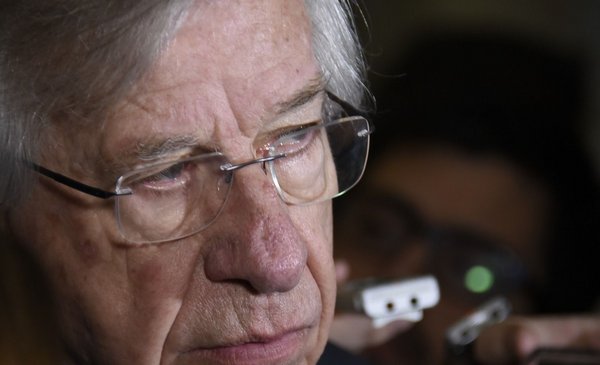The former Minister of Economy and senator of the Broad Front, Daniel Astoripointed against the numbers presented by the Ministry of Economy and Finance (MEF) this Tuesday and considered that there was a $110 million tax increase in 2021Contrary to what the minister said Lily Arbeleche. At the MEF conference, the hierarch maintained that public money was responsibly managed without an increase in taxes.
Astori assured in an interview with this is how it goes Radio carve that”All Uruguayans must think it positive that there is growth, poverty reduction and the creation of new jobs“However, the problems begin when you analyze how these results were obtained and there you have “very important differences” with the government.
The accountant and twice Minister of Economy during the FA governments, affirmed that Arbeleche “is limited to pointing out that by having lowered the fiscal deficit, the results that she announced were achieved. However, we see that they were achieved in a breach of the campaign promises: to cut with the supposed ‘waste’; there were no savings but investment cuts, and taxes were increased by more than US$ 110 million”Held.
“Far from favoring people who have had a worse time, they have harmed them. Because this whole issue rests on one side on a significant drop in wages and liabilitiesand (on the other in) a tax increase, which has not been distributed equitably among the population”. The senator also judged that public investment “is on the ground”.
“Over and over they repeated that there was going to be neither a tax increase nor a fee increase,” Astori recalled.
Astori based his estimate of US$ 110 million in last year’s reinstatement of the “covid tax” on public workers, the reduction of the VAT discount for electronic payments and the adjustment of the income tax bands based on the evolution of the Average Salary Index (IMS) and not by the Consumer Price Index (CPI) as the FA did. The latter “represented an increase in the effective tax burden” because wages rose below inflation, according to the former minister. Minister Arbeleche has refuted this accusation and pointed out that the change in the criteria for adjusting the IRPF bands had a “neutral” fiscal effect for the state coffers.
In addition, Astori recalled that During the governments of the Broad Front, the then opposition complained “again and again, calling it ‘rates’ our evolutions (of tariff prices)” and yet “during the years that the government has been in office, gasoline increased 15.5%, diesel 14.5% and wages 6.9%. This really is a great price for people”, he asserted.
On the other hand, the senator said that Facing the referendum, the government abruptly went from managing the price of fuels taking care of the fiscal results to doing so with “electoral criteria.”
The omission of inflation and the pessimism of the FTA with China
Astori claimed to be surprised by the absence of mentions of inflation in the MEF presentation. “Last year at some point the minister said: ‘We are going to be measured by the fiscal deficit and inflation,'” she recalled (it was in 2020, in a Interview with The Observer). “From the fiscal deficit, the qualification is negative because they have made a priority use of the result, reducing fundamental expenses for the country and about inflation he said nothing, absolutely nothing! He left it to the Central Bank when it is an economy-wide issue.”
However, Astori admitted that the problem of inflation at this moment “is very complicated not only in Uruguay but at a global and regional level” and “the prices of raw materials have an influence” by being so high.
On the 48 thousand jobs recovered, the former minister put them in perspective that employment was greatly affected by the pandemic and said that the increase responded to “a kind of rebound”. “Too bad it was done at the expense of wages”, he added. “I know that sometimes the ’employment’ objective contradicts the ‘salary’ objective, obviously, (…) but we have to make that possible and the negotiation mechanisms have to constitute the scope to achieve that compatibility” she stressed.
Also, the accountant stated that He does not believe that a Free Trade Agreement (FTA) will be signed between Uruguay and China. From his point of view, the Asian giant cares more about taking care of its relationship with the largest countries in South America than with Uruguay and, therefore, signing an FTA with the country “It will never do it if it is against the will of Argentina and Brazil”.
The debate for the LUC
“The discussion has lowered the level of one side and the other”Astori lamented, “I don’t like the campaign or how it’s being handled on both sides.” For the former Minister of Economy, “an effort should be made by both parties to focus on a more rigorous analysis of the articles that are questioned“.
Despite this, he believed that the government’s own behavior contributed to the poor quality of the debate due to the way in which the LUC is composed. “All the political parties have used this instrument, but I had never seen a bill with hundreds of articles that dealt with the vast majority of fundamental issues for the population,” something that “notoriously impedes knowledge of the law“.”The instrument itself leads to poor treatment of the issue“, summarized.






